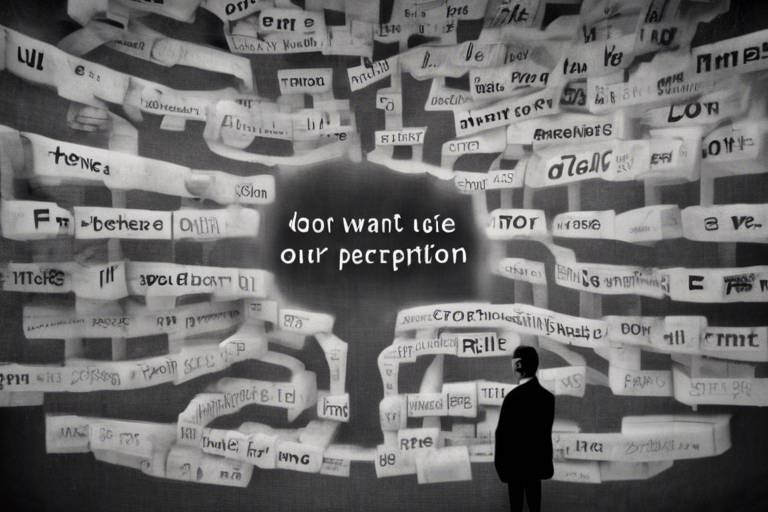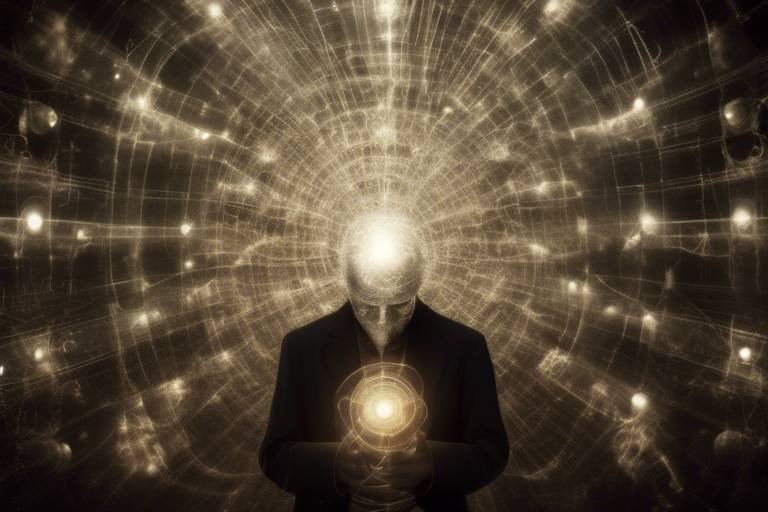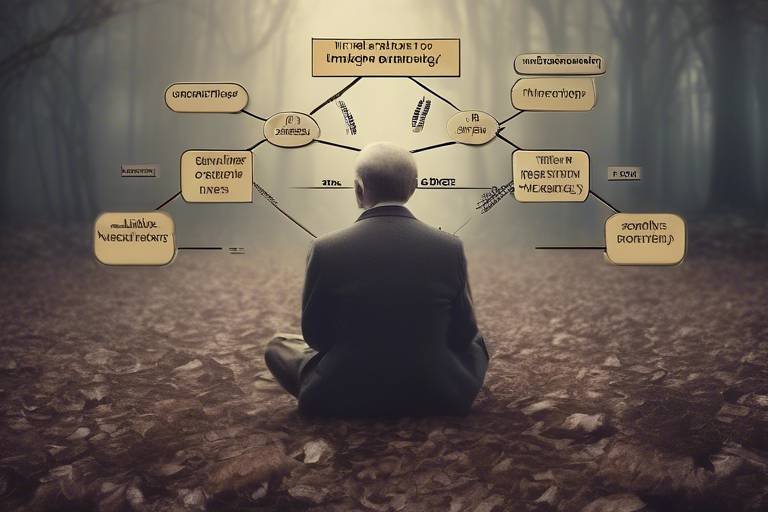The Role of Ontology in Defining Human Nature
Have you ever pondered what it truly means to be human? This question, while seemingly straightforward, dives deep into the realms of philosophy, particularly through the lens of ontology. Ontology, as a branch of philosophy, scrutinizes the very nature of being and existence. It compels us to explore not just the physical attributes of humanity but also the essence that defines our identities, morals, and existence itself. In this article, we will journey through various philosophical perspectives that illuminate how ontology shapes our understanding of human nature. By examining historical contexts and modern theories, we will uncover the intricate web of ideas that contribute to our perception of what it means to be human.
At its core, ontology asks the fundamental questions: What is existence? What does it mean to be? These inquiries are not merely academic; they resonate with our daily lives, influencing how we view ourselves and others. The implications of ontology stretch into diverse fields such as psychology, sociology, and even artificial intelligence, making it a cornerstone for understanding human nature. As we delve deeper, we will see how ontological theories not only define our existence but also challenge us to rethink our identities and ethical frameworks.
So, why should we care about ontology in the context of human nature? Well, understanding ontology can help us navigate the complexities of our identities in a world that is constantly changing. With the rise of technology and shifting cultural narratives, our sense of self is often in flux. By engaging with ontological questions, we can better grasp the fluidity of identity and the factors that shape our moral compass. In essence, ontology provides a roadmap for understanding our place in the universe and the interconnectedness of all beings.
As we proceed, we will explore the historical evolution of ontological thought, beginning with ancient philosophers like Plato and Aristotle. These thinkers laid the groundwork for understanding human nature through their unique perspectives on existence. Plato's Theory of Forms invites us to consider the abstract essence of humanity beyond mere physicality, while Aristotle's Substance Theory grounds our understanding in the tangible properties of individual entities. Together, these ancient perspectives set the stage for modern ontological theories that continue to challenge and expand our understanding of what it means to be human.
- What is ontology? Ontology is the philosophical study of the nature of being, existence, and reality, focusing on the categories of being and their relationships.
- How does ontology relate to human nature? Ontology influences our understanding of human nature by exploring concepts of existence, identity, and morality, shaping how we perceive ourselves and others.
- Who are some key philosophers in ontology? Notable philosophers include Plato, Aristotle, Immanuel Kant, and more contemporary thinkers who have expanded ontological discussions.
- Why is understanding ontology important? Understanding ontology helps us navigate complex issues related to identity, ethics, and our place in the world, especially in light of technological advancements.

Understanding Ontology
Ontology, at its core, is a fascinating branch of philosophy that delves into the very essence of being. Imagine sitting down with a cup of coffee, pondering the big questions: What does it mean to exist? What is reality? These are the types of inquiries that ontology seeks to answer. It investigates a myriad of concepts related to existence and reality, and it categorizes different forms of being, which are crucial for defining what it means to be human. When we talk about ontology, we’re not just playing with abstract ideas; we’re engaging in a profound exploration of our own human nature.
To put it simply, ontology helps us understand the fundamental categories of existence. Think of it as a map that guides us through the complex terrain of reality. Just like a map highlights different regions and landmarks, ontology categorizes various forms of being, such as physical objects, abstract concepts, and even emotions. This categorization is essential because it allows us to frame our understanding of ourselves and the world around us. For instance, when we consider the nature of a tree, we might think of it as a physical entity, but ontology encourages us to explore its essence, its purpose, and its relationship to other entities in the ecosystem.
One of the critical questions ontology raises is about the nature of existence itself. Are we merely biological organisms, or is there something more? This query leads to various philosophical debates, including the distinction between substance and essence. Substance refers to what something is made of, while essence pertains to what makes something fundamentally what it is. In the context of human beings, this distinction is vital as it shapes our understanding of identity, morality, and existence.
Moreover, ontology intersects with other philosophical inquiries, such as epistemology, which is the study of knowledge. How we define existence influences our understanding of what we can know about ourselves and the world. For example, if we consider human beings as merely biological machines, our epistemological framework might lead us to conclude that emotions and consciousness are mere byproducts of physical processes. However, if we recognize a deeper essence to human existence, we might explore more complex dimensions of knowledge and understanding.
In summary, ontology serves as a foundational pillar in the effort to comprehend human nature. It invites us to challenge our assumptions and engage with the profound questions that define our existence. By examining the various categories of being and their implications, we can gain deeper insights into our identity, morality, and the very essence of what it means to be human. As we navigate through life, ontology acts as a compass, guiding us through the intricate web of reality and helping us understand our place within it.
- What is ontology? - Ontology is a branch of philosophy that studies the nature of being, existence, and the categories of being.
- How does ontology relate to human nature? - Ontology helps define and explore the essence of what it means to be human, influencing our understanding of identity and morality.
- Why is ontology important? - It provides a framework for understanding existence and reality, allowing us to engage with profound philosophical questions about our identity and place in the world.

The Historical Context of Ontology
Understanding the historical context of ontology is essential for grasping how our perceptions of human nature have evolved over time. From the ancient philosophical roots to contemporary discussions, ontology has been shaped by the contributions of various thinkers who have sought to answer fundamental questions about existence and reality. The journey through time reveals a tapestry of ideas that reflect the shifting paradigms of thought.
In ancient Greece, philosophers like Plato and Aristotle laid the groundwork for ontological discussions. Their theories not only explored the essence of humanity but also delved into the nature of existence itself. Plato's Theory of Forms posited that beyond our tangible world lies a realm of abstract forms, which represent the true essence of all things. This perspective suggests that our understanding of human nature is not confined to the physical realm but is instead connected to these higher ideals.
Aristotle, on the other hand, offered a more grounded approach with his Substance Theory. He emphasized the importance of individual entities and their properties, arguing that understanding the essence of a being requires examining its concrete characteristics. This shift from the abstract to the tangible marked a significant evolution in ontological thought, paving the way for future inquiries into what it means to be human.
As we moved into the Middle Ages, ontological discussions were heavily influenced by religious thought. Philosophers like Thomas Aquinas attempted to reconcile Aristotelian philosophy with Christian theology, introducing concepts that emphasized the divine nature of existence. This era saw ontology intertwined with metaphysics, where discussions about being were often linked to the nature of God and the creation of the universe.
The Enlightenment brought a wave of new ideas and challenges to traditional ontological views. Thinkers such as René Descartes and Immanuel Kant shifted the focus to the nature of knowledge and perception. Descartes famously declared, "I think, therefore I am," emphasizing the role of consciousness in defining existence. Kant, meanwhile, introduced the concept of categories of understanding, arguing that our perceptions shape our reality, thus influencing our understanding of human nature.
In the 19th and 20th centuries, the advent of modern philosophy saw a dramatic expansion of ontological inquiries. Philosophers like Martin Heidegger and Jean-Paul Sartre challenged traditional views by introducing existentialist ideas. They emphasized the importance of individual experience and choice, arguing that existence precedes essence. This shift highlighted the fluidity of identity and the role of personal agency in defining what it means to be human.
Overall, the historical context of ontology is rich and complex, filled with the contributions of various thinkers who have shaped our understanding of human nature. Each philosophical movement has added layers of meaning, reflecting the changing landscape of thought and the ongoing quest to understand existence. As we continue to explore these ideas, it becomes clear that ontology is not merely an abstract discipline but a vital framework that influences our perceptions of identity, morality, and existence itself.
- What is ontology? - Ontology is a branch of philosophy that studies the nature of being, existence, and the categories of being.
- Who are the key philosophers in ontology? - Key philosophers include Plato, Aristotle, Thomas Aquinas, René Descartes, Immanuel Kant, Martin Heidegger, and Jean-Paul Sartre.
- How does ontology relate to human nature? - Ontology provides a framework for understanding the essence of humanity and influences our perceptions of identity and morality.
- What is the significance of historical context in ontology? - The historical context helps us understand how philosophical ideas have evolved and how they shape our current understanding of existence.

Ancient Philosophical Perspectives
When we dive into the world of ancient philosophy, we find ourselves at the crossroads of profound thoughts and ideas that have shaped the very fabric of our understanding of human nature. Think of it as a treasure chest filled with insights from great minds like Plato and Aristotle, who laid the groundwork for ontological discussions that still resonate today. Their contributions not only illuminate the essence of humanity but also challenge us to ponder the nature of existence itself.
Let’s start with Plato, who introduced the fascinating Theory of Forms. Imagine a world where every object you see is just a shadow of its true self. Plato believed that beyond our physical reality lies a realm of perfect forms—ideal versions of everything, including human nature. According to him, these forms represent the ultimate truth, and our understanding of humanity is merely a reflection of these ideals. This perspective invites us to question: Are we merely imitations of a perfect human, or do we possess an essence that defines us?
On the other hand, we have Aristotle, who took a more grounded approach with his Substance Theory. He argued that every individual entity, including humans, has a unique substance that defines its existence. This theory emphasizes the importance of tangible characteristics and properties, steering away from the abstract ideals proposed by Plato. Aristotle’s view prompts us to consider how our individual traits, experiences, and actions contribute to our identity. Are we more than just our thoughts and ideals? Aristotle would say yes, as he believed that our essence is deeply rooted in our physical presence and interactions with the world.
Both philosophers provide us with contrasting yet complementary perspectives on human nature. While Plato beckons us to look beyond the physical and explore the realm of ideals, Aristotle grounds us in reality, urging us to recognize the significance of our existence as individual beings. This duality in thought raises essential questions about who we are and how we define our nature. Are we striving to reach an ideal, or are we defined by the sum of our experiences and choices?
As we reflect on these ancient philosophical perspectives, it's clear that they continue to influence modern discussions about ontology and human nature. They remind us that understanding ourselves is not just a journey of self-discovery but also an exploration of the broader questions that have puzzled humanity for centuries. So, how do these ideas shape our current understanding of identity and existence? The dialogue between these ancient thinkers and contemporary philosophy is ongoing, and it invites us to engage with our own beliefs about what it means to be human.
- What is ontology? Ontology is a branch of philosophy that studies the nature of being, existence, and the categories of being.
- Who were the key philosophers in ancient ontology? The key philosophers include Plato and Aristotle, who provided foundational insights into human nature and existence.
- How does Plato's Theory of Forms relate to human nature? Plato's Theory of Forms suggests that the true essence of humanity exists in an ideal realm, beyond our physical reality.
- What does Aristotle's Substance Theory emphasize? Aristotle's Substance Theory emphasizes the importance of individual entities and their properties in understanding human nature.

Plato's Theory of Forms
Plato's Theory of Forms is a fascinating cornerstone of his philosophical framework, positing that the material world we perceive is merely a shadow of a higher, unchanging reality. According to Plato, the true essence of objects—what they really are—exists in a realm of perfect Forms or Ideas. For instance, when we think of a particular chair, we might picture it in various shapes, colors, and materials. However, Plato would argue that all these variations are mere imitations of the ideal Form of 'Chairness' that exists beyond our sensory experiences.
This theory suggests that our understanding of human nature is similarly flawed and incomplete. Just as we can never fully grasp the perfect Form of a chair, we struggle to comprehend the true essence of humanity when we focus solely on physical attributes or societal roles. Plato believed that through philosophical reasoning and intellectual pursuit, we could ascend from the world of appearances to the realm of Forms, gaining deeper insights into our own nature and existence.
Furthermore, Plato’s allegory of the cave vividly illustrates this concept. Imagine prisoners chained inside a dark cave, only able to see shadows cast on a wall by objects behind them. They mistake these shadows for reality. When one prisoner escapes and discovers the outside world, he realizes that the shadows were mere illusions. This journey symbolizes the philosopher's quest for knowledge and truth, emphasizing the importance of seeking the Forms to understand the essence of being.
In the context of human nature, Plato's Theory of Forms challenges us to look beyond superficial characteristics such as behavior or societal labels. Instead, it urges us to explore the abstract qualities that define humanity—qualities like justice, beauty, and goodness. These Forms represent ideals that we strive towards but can never fully attain, reflecting the complexity and depth of human existence.
To summarize, Plato's Theory of Forms invites us to reconsider our understanding of what it means to be human. It encourages a pursuit of knowledge that transcends the tangible, pushing us to seek the deeper truths that lie beneath the surface of our everyday experiences. This philosophical inquiry not only shapes our identity but also influences our moral frameworks and interactions with one another.

Aristotle's Substance Theory
Aristotle's Substance Theory is a cornerstone of his philosophical framework, offering a profound insight into the essence of human nature. At its core, this theory posits that everything in the universe is made up of substances, which are defined as individual entities that possess distinct properties. For Aristotle, substances are not merely physical objects but are also characterized by their potentialities and actualities. This means that a substance is defined not only by what it is but also by what it can become.
To understand Aristotle's perspective, we can break down his view into several key components:
- Essence: The essence of a substance refers to its fundamental nature, which distinguishes it from other entities. For example, the essence of a human being includes rationality, which sets us apart from other living creatures.
- Accidents: While essence defines what a substance is, accidents are properties that can change without affecting the substance's core identity. For instance, a person's hair color or height are accidents that do not alter their essential humanity.
- Potentiality and Actuality: Aristotle emphasized the importance of potentiality—the capacity for change—and actuality—the realization of that potential. A human being has the potential to learn, grow, and evolve throughout their life, which is crucial for understanding human development.
This framework allows us to see human nature as a dynamic interplay between what we are (our essence) and what we can become (our potential). Aristotle's approach is particularly significant when we consider the implications it has for our understanding of identity. In a world that often emphasizes static definitions of who we are, Aristotle invites us to embrace the fluidity and complexity of human existence.
Moreover, Aristotle's Substance Theory challenges us to reflect on the nature of our moral responsibilities. By recognizing that individuals are not merely products of their environment or circumstances, we can appreciate the role of personal agency in shaping our identities. This perspective aligns with contemporary discussions about the importance of individual choice and responsibility, echoing themes found in existentialist thought.
In summary, Aristotle's Substance Theory provides a rich and nuanced understanding of human nature. It encourages us to consider not only our essential qualities but also our potential for growth and change. This dual focus on essence and potentiality is essential for navigating the complexities of identity in our modern world.
What is Aristotle's Substance Theory?
Aristotle's Substance Theory posits that everything in the universe consists of substances, which are individual entities characterized by their essence and properties. It emphasizes the distinction between what a substance is and what it can become.
How does Aristotle differentiate between essence and accidents?
Essence refers to the fundamental nature of a substance that defines what it is, while accidents are properties that can change without altering the core identity of the substance.
Why is potentiality important in Aristotle's philosophy?
Potentiality highlights the capacity for change and growth within a substance. For human beings, this means recognizing our ability to learn and evolve throughout our lives, which is crucial for understanding personal identity.

Modern Ontological Theories
In the realm of philosophy, modern ontological theories have emerged as a dynamic response to the complexities of our existence in an ever-changing world. These theories challenge traditional views and introduce fresh perspectives that reshape our understanding of what it means to be human. Think of modern ontology as a kaleidoscope, where each turn reveals a new pattern of thought, reflecting the multifaceted nature of reality and existence.
One prominent modern ontological theory is phenomenology, which focuses on the structures of experience and consciousness. Pioneered by philosophers like Edmund Husserl and later expanded by Martin Heidegger, phenomenology emphasizes the subjective experience of individuals as a fundamental aspect of being. This approach encourages us to explore our lived experiences, revealing how our perceptions shape our understanding of reality. By examining how we experience the world, phenomenology provides insights into the essence of human nature itself.
Another significant contribution comes from existential ontology, which is closely tied to existentialism. Thinkers such as Jean-Paul Sartre and Simone de Beauvoir argue that existence precedes essence, suggesting that individuals must create their own meanings and values in a world devoid of inherent purpose. This perspective places immense responsibility on individuals to define their identities and navigate their moral landscapes. In this way, existential ontology acknowledges the fluidity of human nature, emphasizing that it is not a fixed essence but rather a continuous process of becoming.
Furthermore, the rise of postmodern ontology has introduced a critical lens on the narratives that shape our understanding of existence. Postmodern thinkers like Michel Foucault and Jacques Derrida challenge the idea of a singular, objective reality, arguing instead that our understanding of being is constructed through language, culture, and power dynamics. This approach highlights the importance of context in shaping human identity and experience, suggesting that our nature is influenced by societal structures and discourses.
To summarize, modern ontological theories invite us to reconsider our understanding of human nature through various lenses. From the subjective experiences highlighted by phenomenology to the individual responsibility emphasized in existential ontology, and the critical perspectives offered by postmodern thought, these theories collectively enrich our comprehension of what it means to be human. As we navigate the complexities of modern life, these frameworks provide valuable insights into our identities, moral frameworks, and the very essence of our existence.
- What is ontology?
Ontology is the branch of philosophy that studies the nature of being, existence, and reality.
- Who are some key figures in modern ontology?
Key figures include Edmund Husserl, Martin Heidegger, Jean-Paul Sartre, and Michel Foucault.
- How does modern ontology differ from traditional ontology?
Modern ontology often challenges traditional views, emphasizing subjective experience, individual responsibility, and the influence of social contexts.
- What role does language play in postmodern ontology?
In postmodern ontology, language is seen as a crucial factor that shapes our understanding of reality and identity.

Ontology and Identity
When we dive into the intricate relationship between ontology and identity, we're essentially peeling back the layers of what it means to be human. Understanding our identity isn't just a matter of knowing our name or where we come from; it's about grasping the very essence of our being. This exploration raises some profound questions: What makes us who we are? Is it our thoughts, our experiences, or perhaps something deeper? Ontological theories provide a framework to navigate these questions, shedding light on how our existence shapes our self-perception.
One of the most captivating aspects of ontology is its ability to intertwine with our sense of self. For instance, consider the existentialist viewpoint which posits that existence precedes essence. This means that we are not born with a predetermined nature; instead, we define ourselves through our choices and actions. It's like being handed a blank canvas at birth—every decision we make adds color, texture, and depth to our unique masterpiece. This perspective empowers us, placing the responsibility of identity firmly in our hands.
On the flip side, we have social constructivism, which argues that our identities are heavily influenced by the social contexts and cultural narratives we inhabit. This theory suggests that our understanding of who we are isn't solely an internal affair; it's shaped by the external world around us. Think about it: our identities are like a patchwork quilt, stitched together by societal norms, cultural expectations, and personal experiences. This view challenges the essentialist perspective, suggesting that human nature is not a fixed entity but rather a fluid and dynamic construct that evolves over time.
To illustrate these concepts further, let’s break down some key elements of ontology and identity in the following table:
| Concept | Description |
|---|---|
| Existentialism | Focuses on individual choice and the idea that existence precedes essence, allowing for personal responsibility in defining identity. |
| Social Constructivism | Emphasizes the role of social contexts and cultural narratives in shaping identity, arguing that it is fluid rather than fixed. |
As we navigate through life, the interplay of these ontological theories can lead to a richer understanding of our identities. They remind us that while we may have the power to shape our own paths, we are also influenced by the world around us. Our identities are not just personal; they are communal, interwoven with the threads of society and culture.
In conclusion, ontology plays a pivotal role in shaping our understanding of identity. By recognizing the balance between existentialist freedom and social constructivist influence, we can appreciate the complexity of what it means to be human. So, the next time you ponder your identity, remember: it’s a dynamic interplay of choices, experiences, and societal influences that define who you are.
- What is ontology? Ontology is a branch of philosophy that studies the nature of being, existence, and reality.
- How does ontology relate to identity? Ontology helps us understand the essence of our being, influencing how we perceive and define our identities.
- What are the main theories of identity in ontology? The main theories include existentialism, which emphasizes individual choice, and social constructivism, which focuses on societal influences.

Existentialism and Human Nature
Existentialism is a fascinating philosophical movement that dives deep into the essence of human existence. At its core, existentialism posits that existence precedes essence, meaning that we first exist, and only later do we define our essence through choices and actions. This perspective is incredibly empowering yet daunting; it places the burden of defining oneself squarely on the individual. Imagine standing at a crossroads with countless paths ahead, each representing a different choice that shapes who you are. This is the essence of existentialism—an invitation to embrace our freedom and responsibility.
One of the key figures in existentialism, Jean-Paul Sartre, famously stated, "We are condemned to be free." This notion suggests that while we have the freedom to make choices, we also bear the weight of those choices. Think about it: every decision we make, from the mundane to the monumental, contributes to our identity. It's like sculpting a statue; every chip and carve is a reflection of our choices, shaping who we become over time. In this context, human nature is not a fixed trait but a dynamic process influenced by our decisions, experiences, and interactions.
Furthermore, existentialism challenges us to confront the absurdity of life. Life can feel chaotic and devoid of inherent meaning, which can be unsettling. However, existentialists argue that it's up to us to create our own meaning. This idea resonates with many people today, as we navigate a world filled with uncertainties. By taking ownership of our existence, we can forge a path that reflects our values and beliefs, ultimately shaping our understanding of what it means to be human.
In existential thought, the concept of authenticity is crucial. To live authentically means to act in accordance with one's true self, rather than conforming to societal expectations or external pressures. This journey toward authenticity often involves introspection and self-discovery, akin to peeling back the layers of an onion. As we strip away the influences that shape us, we uncover our true desires and motivations. This process can be both liberating and challenging, as it requires us to face uncomfortable truths about ourselves.
Ultimately, existentialism encourages a profound exploration of the self, urging us to question who we are and what we stand for. It invites us to embrace our freedom and the responsibility that comes with it, allowing us to define our own human nature. In a world that often seeks to categorize and label us, existentialism offers a refreshing reminder that we are not bound by any singular definition. Instead, we are a tapestry of experiences, choices, and aspirations, continuously evolving and redefining what it means to be human.
- What is existentialism? Existentialism is a philosophical movement that emphasizes individual existence, freedom, and choice, asserting that individuals create their own meaning in life.
- Who are the key figures in existentialism? Some prominent existentialist philosophers include Jean-Paul Sartre, Simone de Beauvoir, and Friedrich Nietzsche.
- How does existentialism view human nature? Existentialism posits that human nature is not fixed but is shaped by individual choices and experiences over time.
- What does "existence precedes essence" mean? This phrase means that individuals first exist and then define their essence through their actions and choices.

Social Constructivism
When we dive into the realm of , we encounter a fascinating perspective that fundamentally challenges the notion of a fixed human nature. This theory posits that what we consider to be "human nature" is not a static essence but rather a dynamic construct shaped by our social interactions and cultural narratives. Imagine human nature as a clay sculpture; it is continuously molded and reshaped by the hands of society, culture, and individual experiences. In this view, our identities are not merely discovered but are actively constructed through our engagement with the world around us.
Social constructivism emphasizes the role of language, social practices, and shared beliefs in shaping our understanding of ourselves and others. It suggests that our identities are fluid, adapting to the context and the social environments we inhabit. For instance, consider how different cultures have varying norms regarding gender roles. What it means to be "masculine" or "feminine" can differ dramatically across societies and historical periods. This variability illustrates that human identity is not a one-size-fits-all concept but rather a tapestry woven from diverse cultural threads.
Furthermore, social constructivism invites us to critically examine the power dynamics at play in the formation of our identities. Who gets to define what is "normal" or "acceptable" in society? Often, these definitions are influenced by those in positions of power, which can marginalize alternative identities and experiences. By acknowledging this, we open ourselves to a more inclusive understanding of humanity, one that recognizes the richness of different perspectives and experiences.
In practical terms, social constructivism has significant implications for various fields, including education, psychology, and sociology. For example, in educational settings, recognizing that students come with different backgrounds allows educators to tailor their approaches to meet diverse needs. This adaptability fosters an environment where all students can thrive, reflecting the core idea of social constructivism—that learning is a social process.
In summary, social constructivism challenges us to rethink our assumptions about what it means to be human. It highlights the importance of context, culture, and social interaction in shaping our identities. By embracing this perspective, we can foster a deeper understanding of ourselves and others, paving the way for a more inclusive and empathetic society.
- What is social constructivism?
Social constructivism is a theory that suggests our understanding of reality, including human nature, is constructed through social interactions and cultural contexts.
- How does social constructivism differ from essentialism?
While essentialism posits that human nature is fixed and inherent, social constructivism argues that it is fluid and shaped by social and cultural influences.
- What are the implications of social constructivism in education?
In education, social constructivism encourages personalized learning approaches that consider students' diverse backgrounds and experiences.
- Can social constructivism apply to other fields?
Yes, social constructivism has applications in various fields, including psychology, sociology, and anthropology, influencing how we understand identity and social behavior.

Ontology and Morality
When we dive into the intricate relationship between ontology and morality, we uncover a fascinating landscape where our understanding of existence directly influences how we perceive right and wrong. At its core, ontology is about the nature of being, and when we apply this concept to morality, we begin to see how our beliefs about what it means to be human shape our ethical frameworks. Imagine morality as a map, guiding us through the complexities of life. The contours of this map are drawn by our ontological beliefs, which dictate the paths we consider acceptable and the destinations we deem worthy.
One of the most compelling aspects of this relationship is how different ontological theories inform our moral judgments. For instance, deontological ethics, which emphasizes the inherent morality of actions, rests heavily on the belief that certain duties and rules are fundamental to human existence. This perspective suggests that there are universal moral laws that apply to all humans, regardless of context. If we accept this view, then our understanding of human nature becomes a critical factor in determining which actions are deemed morally right. In essence, if we believe that humans have an intrinsic value or dignity, this belief will inevitably guide our moral decisions.
On the flip side, we have consequentialism, a moral framework that evaluates the morality of actions based on their outcomes. This perspective challenges us to think critically about the implications of our choices. Here, the focus shifts from the action itself to the results it produces. Imagine a scenario where a decision leads to a greater good, but involves morally questionable actions. This raises profound ontological questions: What does it mean to be human if our morality is contingent upon outcomes? Are we then mere calculators of pleasure and pain, or is there something more profound at play?
To illustrate these concepts further, let’s consider a table that summarizes the key differences between deontological ethics and consequentialism:
| Aspect | Deontological Ethics | Consequentialism |
|---|---|---|
| Focus | Inherent morality of actions | Outcomes of actions |
| Key Question | What is the right action? | What are the consequences? |
| View of Human Nature | Humans have intrinsic moral value | Humans as decision-makers based on outcomes |
As we navigate these ethical waters, it becomes clear that our ontological beliefs are not just abstract ideas; they are the very foundation upon which our moral decisions stand. This interplay between ontology and morality invites us to engage in deeper reflection about our values, our choices, and ultimately, our humanity. Are we simply products of our circumstances, or do we possess an inherent nature that guides our moral compass?
In conclusion, understanding the relationship between ontology and morality is crucial for anyone seeking to grasp the complexities of human nature. It challenges us to confront our beliefs about existence and encourages us to consider how these beliefs shape our moral landscapes. As we continue to explore these philosophical questions, we may find that the answers are as dynamic and evolving as humanity itself.
- What is ontology? Ontology is a branch of philosophy that studies the nature of being, existence, and the categories of being.
- How does ontology relate to morality? Ontology influences our understanding of what it means to be human, which in turn shapes our moral frameworks and ethical decisions.
- What are deontological ethics? Deontological ethics focuses on the morality of actions based on adherence to rules or duties, regardless of the consequences.
- What is consequentialism? Consequentialism evaluates the morality of actions based on their outcomes, emphasizing the results rather than the actions themselves.

Deontological Ethics
When we dive into the realm of , we encounter a fascinating perspective that emphasizes the intrinsic morality of actions rather than their consequences. Imagine a world where the rightness or wrongness of an action is determined by its adherence to a set of rules or duties, regardless of the outcome. This is the essence of deontological ethics, which is often associated with the philosopher Immanuel Kant. Kant argued that moral actions are those performed out of a sense of duty and guided by universal maxims, meaning that if an action is right for one, it should be right for all.
In this ethical framework, the focus shifts from what happens as a result of our actions to the intentions behind them. For instance, if you help someone in need, the act itself is considered morally good because it stems from a sense of duty, not just because it might lead to a positive outcome. This perspective raises intriguing questions about human nature: Are we inherently good, or do we only act morally when we feel obligated? Deontological ethics suggests that our moral compass is rooted in our ability to recognize and fulfill our duties, which can be seen as a fundamental aspect of what it means to be human.
To further illustrate the principles of deontological ethics, consider the following key points:
- Universalizability: The idea that an action is only morally acceptable if it can be made a universal law applicable to everyone.
- Respect for Persons: Individuals must be treated as ends in themselves, not merely as means to an end.
- Moral Absolutism: Certain actions are categorically right or wrong, regardless of the context or consequences.
These principles highlight how deontological ethics provides a robust framework for understanding morality that aligns closely with our perceptions of human nature. It challenges us to consider not just the outcomes of our actions but the moral duties we hold toward ourselves and others. In a world that often prioritizes results over intentions, deontological ethics serves as a reminder that our moral responsibilities are deeply intertwined with our identity as humans.
As we navigate complex moral dilemmas—whether in personal relationships, professional settings, or societal issues—deontological ethics encourages us to reflect on our duties and the ethical principles we uphold. It prompts us to ask questions like: Are we acting out of genuine moral duty, or are we simply chasing favorable outcomes? This inquiry into the nature of our actions and motivations is crucial for understanding not only our moral landscape but also the very essence of what it means to be human.
- What is deontological ethics?
Deontological ethics is an ethical theory that emphasizes the importance of following moral rules and duties, asserting that actions are morally right or wrong based on their adherence to these principles, regardless of the consequences. - Who is the main philosopher associated with deontological ethics?
The philosopher Immanuel Kant is most commonly associated with deontological ethics, particularly through his concepts of duty and moral law. - How does deontological ethics differ from consequentialism?
While deontological ethics focuses on the morality of actions based on rules and duties, consequentialism evaluates actions based on their outcomes or consequences. - Can deontological ethics apply in real-life situations?
Yes, deontological ethics can guide moral decision-making in various situations by encouraging individuals to consider their duties and the ethical principles they uphold.

Consequentialism
Consequentialism is a fascinating ethical theory that evaluates the morality of actions based on their outcomes. In simpler terms, it suggests that the rightness or wrongness of an action is determined by the results it produces. This perspective challenges the more traditional deontological ethics, which focus on the inherent morality of actions themselves, irrespective of their consequences. Imagine you're at a crossroads: one path leads to a small benefit for a few individuals, while the other path promises immense benefits for a larger group. A consequentialist would advocate for the path that maximizes overall happiness, often summarized by the phrase "the greatest good for the greatest number."
One of the most compelling aspects of consequentialism is its flexibility. It allows for a wide range of actions as long as they lead to favorable outcomes. This can lead to moral dilemmas, particularly when the consequences of an action can be interpreted in various ways. For instance, consider a scenario where a lie could save someone's life. A strict deontologist might argue that lying is inherently wrong, while a consequentialist would weigh the potential life saved against the moral cost of lying. This illustrates how consequentialism encourages a pragmatic approach to ethics, one that is often more aligned with real-world complexities.
Consequentialism can be further divided into different branches, including:
- Utilitarianism: This is perhaps the most well-known form of consequentialism, which advocates for actions that maximize overall happiness or utility.
- Rule Consequentialism: This variant suggests that we should follow rules that generally lead to the best consequences, rather than evaluating each action on a case-by-case basis.
- Negative Consequentialism: This approach emphasizes minimizing harm rather than maximizing good, focusing on reducing suffering as a primary ethical goal.
Each of these branches presents unique implications for understanding human nature. For example, utilitarianism prompts us to consider the collective well-being, pushing us to think beyond individual desires and recognize the interconnectedness of our actions. This is particularly relevant in today's globalized world, where our decisions can have far-reaching effects on communities and environments. The ethical considerations of climate change policies, healthcare, and social justice movements are often framed through a consequentialist lens, highlighting the importance of outcomes in shaping our moral landscape.
However, this focus on outcomes can also lead to controversial ethical justifications. For instance, in extreme situations, a consequentialist might argue that sacrificing one individual for the greater good is acceptable. This raises profound questions about the value of individual rights and the moral boundaries we should adhere to. As we navigate these complex ethical waters, it's essential to critically examine how our understanding of human nature informs our choices and the consequences of those choices.
- What is consequentialism? Consequentialism is an ethical theory that judges the morality of an action based on its outcomes or consequences.
- How does consequentialism differ from deontological ethics? While consequentialism focuses on the results of actions, deontological ethics emphasizes the inherent morality of actions themselves, regardless of their outcomes.
- What are the main types of consequentialism? The main types include utilitarianism, rule consequentialism, and negative consequentialism, each with its unique focus and implications.
- Can consequentialism justify harmful actions? Yes, in some cases, consequentialism can justify harmful actions if they lead to a greater overall good, raising ethical dilemmas about individual rights.

The Future of Ontology in Understanding Humanity
As we stand on the precipice of a new era in philosophy and technology, the future of ontology in understanding humanity is becoming increasingly complex and fascinating. With rapid advancements in fields like artificial intelligence (AI) and genetics, we are forced to confront profound questions about what it means to be human. These inquiries not only challenge our traditional ontological frameworks but also invite us to reconsider our definitions of existence, identity, and morality.
In the realm of artificial intelligence, the emergence of machines that can learn, adapt, and even exhibit behaviors that mimic human consciousness raises critical ontological questions. Are these AI entities merely tools, or do they possess a form of existence that warrants ethical consideration? As we develop more sophisticated AI, we must ask ourselves: What criteria do we use to define consciousness? Can an algorithm truly possess a sense of self, or is it simply a reflection of human programming? These inquiries push the boundaries of traditional ontological discussions and challenge us to redefine our understanding of what it means to be "alive."
Moreover, the field of biological sciences is also reshaping our ontological perspectives. With advancements in genetic engineering and biotechnology, we are beginning to manipulate the very fabric of what it means to be human. Consider the implications of CRISPR technology, which allows us to edit genes and potentially alter human characteristics. This capability raises significant questions: If we can change our genetic makeup, does that alter our essence? Are we still the same beings, or do we become something entirely different? This intersection of ontology and biology invites a reevaluation of our understanding of human nature and existence.
In navigating these complex issues, we can identify several key areas where ontology will play a pivotal role in shaping our understanding of humanity:
- Consciousness: As AI continues to evolve, our understanding of consciousness will need to expand. We must explore whether consciousness is a uniquely human trait or if it can be replicated in machines.
- Identity: The fluidity of identity in a digital age challenges traditional notions of self. How do online personas and virtual realities influence our understanding of who we are?
- Ethics: The moral implications of altering human nature through technology necessitate a reexamination of ethical frameworks. What responsibilities do we hold in shaping future generations?
As we ponder these questions, it becomes clear that ontology is not just an abstract philosophical pursuit; it has real-world implications that will shape our future. The conversations we engage in today about our nature and existence will inform the ethical frameworks and societal norms of tomorrow. The challenge lies in navigating this uncharted territory with care and foresight, ensuring that our advancements in technology enhance, rather than diminish, our understanding of what it means to be human.
- What is ontology? Ontology is a branch of philosophy that studies the nature of being, existence, and the categories of being.
- How does ontology relate to artificial intelligence? Ontology helps us explore questions of consciousness and identity in AI, challenging our traditional views of what it means to be human.
- Can human nature be altered through technology? Yes, advancements in genetics and biotechnology allow us to manipulate human characteristics, prompting a reevaluation of our understanding of human nature.
- Why is the future of ontology important? The future of ontology is crucial because it shapes our understanding of identity, morality, and existence in an increasingly complex world.

Artificial Intelligence and Ontology
As we step into the age of Artificial Intelligence (AI), the crossroads of technology and philosophy becomes increasingly intriguing. The rise of AI challenges our traditional understanding of ontology, particularly in terms of consciousness, identity, and what it truly means to be human. Imagine a world where machines not only perform tasks but also exhibit behaviors that mimic human thinking and decision-making. This blurring of lines raises profound questions: Can an AI possess consciousness? If so, does it have an identity? And how do these developments influence our perception of human nature?
To dive deeper into this topic, we can categorize the implications of AI on ontology into several key areas:
- Consciousness: At the heart of the ontological debate is the question of whether AI can achieve a state of consciousness akin to humans. While machines can process information and learn from data, does this equate to genuine awareness? This question challenges our long-held beliefs about the uniqueness of human experience.
- Identity: As AI systems become more sophisticated, they may develop unique operational patterns that could be interpreted as a form of identity. This leads us to ponder whether an AI can have a personal identity that is distinct from its programming. If an AI can evolve and adapt, does it possess a self?
- Ethical Considerations: The emergence of AI also necessitates a reevaluation of our ethical frameworks. If AI can mimic human-like responses, should we treat them with the same moral consideration as sentient beings? This raises critical questions about our responsibilities toward AI entities and their rights.
Moreover, consider the implications of AI in creative fields. As algorithms generate art, music, and literature, we must ask ourselves: Who is the true creator? If the output is indistinguishable from human-made works, does that challenge the very essence of creativity? In this context, ontology becomes a lens through which we can examine the evolving relationship between humanity and technology.
As we venture further into this digital frontier, we must remain vigilant and thoughtful. The future of ontology in understanding human nature will likely be shaped by our responses to these challenges. Will we embrace a more inclusive definition of existence that encompasses both biological and artificial entities? Or will we cling to traditional views that prioritize human experience above all else? The answers to these questions could redefine our understanding of existence itself.
- What is ontology? Ontology is a branch of philosophy that studies the nature of being, existence, and the categories of being.
- How does AI challenge our understanding of human nature? AI raises questions about consciousness, identity, and ethics, prompting a reevaluation of what it means to be human.
- Can AI possess consciousness? While AI can simulate human-like behaviors, the debate continues on whether it can achieve genuine consciousness.
- What ethical considerations arise with AI? The development of AI necessitates discussions about the rights and moral considerations of artificial entities.

Biological Perspectives
In today's world, the intersection of biology and ontology opens up a fascinating dialogue regarding the essence of human nature. As we delve into the biological perspectives, we find ourselves questioning the very foundation of what it means to be human. Are we merely a complex assembly of cells and DNA, or is there something more profound that defines our existence? The advancements in genetics and evolutionary biology have not only expanded our understanding of human nature but also challenged traditional ontological views.
At the heart of this discussion is the concept of genetic determinism, which suggests that our genes play a pivotal role in shaping our behaviors, preferences, and even our moral compass. While it’s tempting to think that our biological makeup dictates our identity, the reality is much more nuanced. For instance, studies in epigenetics reveal that environmental factors can influence gene expression, suggesting that while our biology sets the stage, it does not dictate the entire performance. This interplay between nature and nurture leads us to reconsider the rigid boundaries of human identity.
Furthermore, the advancements in neuroscience have provided us with insights into how our brain functions influence our perceptions of self and morality. The brain is not just a biological organ; it is a dynamic entity that shapes our thoughts, emotions, and actions. As we learn more about the neural correlates of consciousness, we begin to ask profound questions: If our thoughts and decisions are ultimately the result of neural processes, what does that mean for our sense of agency and responsibility? Are we simply products of our biology, or do we hold the power to transcend our genetic programming?
To illustrate the complexity of this relationship, consider the following table that summarizes key biological factors influencing human nature:
| Biological Factor | Description |
|---|---|
| Genetics | Involves the hereditary information passed from parents to offspring, influencing traits and behaviors. |
| Neuroscience | Studies the structure and function of the nervous system, revealing insights into consciousness and decision-making. |
| Epigenetics | Explores how environmental factors can alter gene expression, impacting development and behavior. |
| Evolutionary Biology | Examines how evolutionary processes shape traits and behaviors, providing a framework for understanding human nature. |
As we navigate these biological perspectives, we cannot ignore the ethical implications that arise. For instance, if our behaviors are largely influenced by our biology, how do we address issues of morality and free will? This leads us to a broader understanding of human nature that integrates both biological and philosophical dimensions. The challenge lies in balancing our biological predispositions with our capacity for rational thought and ethical decision-making.
In conclusion, the biological perspectives on human nature compel us to reevaluate our understanding of existence. As we progress in our knowledge of genetics, neuroscience, and evolutionary biology, we must remain open to the idea that human identity is not a fixed entity but rather a fluid construct shaped by a myriad of factors. The dialogue between biology and ontology is not just academic; it has real-world implications for how we perceive ourselves and each other in an ever-evolving landscape.
- What is the role of genetics in defining human nature?
Genetics provides the foundational blueprint of our biological makeup, influencing traits and behaviors, but it interacts with environmental factors to shape our identity. - How does neuroscience contribute to our understanding of identity?
Neuroscience explores the brain's functions, revealing how our thoughts and emotions are influenced by neural processes, impacting our sense of self and moral decisions. - What is epigenetics?
Epigenetics studies how environmental factors can modify gene expression, illustrating the dynamic relationship between biology and behavior. - Can we transcend our biological programming?
While our biology influences us, many argue that through conscious choice and rational thought, we can shape our identities beyond genetic predispositions.
Frequently Asked Questions
- What is ontology and why is it important in understanding human nature?
Ontology is a branch of philosophy that delves into the nature of being and existence. It helps us explore essential questions about what it means to be human, shaping our understanding of identity, morality, and our place in the universe. By examining different ontological perspectives, we can better grasp the complexities of human nature and how it influences our lives.
- How did ancient philosophers contribute to ontological discussions?
Ancient philosophers like Plato and Aristotle laid the groundwork for ontological thought. Plato's Theory of Forms suggested that abstract ideals represent the true essence of things, while Aristotle's Substance Theory focused on individual entities and their properties. These foundational ideas continue to influence contemporary discussions about human existence and identity.
- What role does existentialism play in understanding personal identity?
Existentialism emphasizes that existence precedes essence, meaning that individuals define their own identities through choices and experiences. This perspective highlights the importance of personal responsibility and freedom in shaping who we are, encouraging a deeper exploration of self-perception and human nature.
- How does social constructivism challenge traditional views of human nature?
Social constructivism argues that human nature is not fixed but shaped by social contexts and cultural narratives. This view challenges essentialist perspectives by highlighting the fluidity of identity, suggesting that our understanding of what it means to be human is influenced by our interactions and the societies we inhabit.
- What is the connection between ontology and morality?
Ontology and morality are intertwined, as our understanding of human nature impacts our ethical frameworks. For instance, deontological ethics focuses on the inherent morality of actions, while consequentialism evaluates actions based on their outcomes. Both perspectives reflect different views on human nature and moral responsibility.
- How might advancements in artificial intelligence affect our understanding of ontology?
The rise of artificial intelligence brings forth significant ontological questions about consciousness and identity. As machines become more sophisticated, we must reconsider what it means to be human and how we define our existence in a world increasingly populated by intelligent systems.
- What biological perspectives challenge traditional ontological views?
Biological advancements, particularly in genetics and evolutionary theory, prompt a reevaluation of our understanding of human nature. These developments challenge traditional ontological views by suggesting that our identities and behaviors are influenced not just by philosophical constructs, but also by our biological makeup and evolutionary history.



















